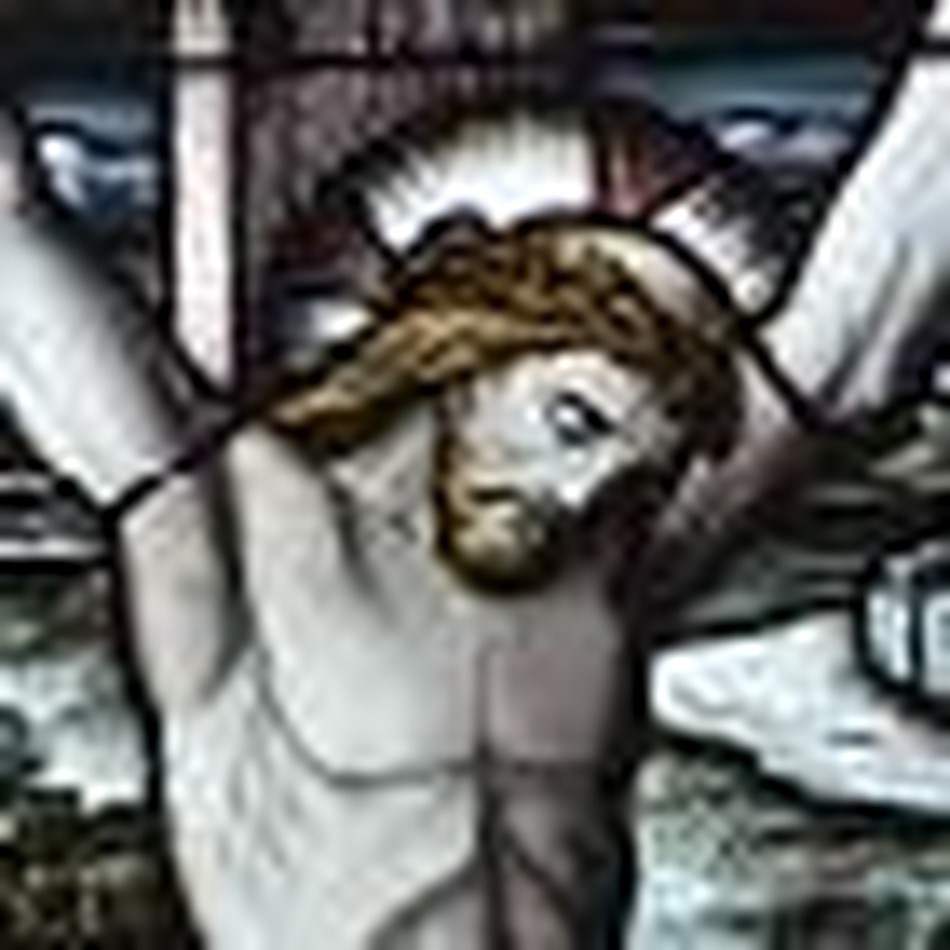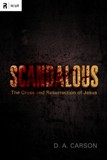Nothing is more central to the Bible than Jesus' death and resurrection. The entire Bible pivots on one weekend in Jerusalem about two thousand years ago. Attempts to make sense of the Bible that do not give prolonged thought to integrating the crucifixion and resurrection of Jesus are doomed to failure. At best, they are exercises in irrelevance.
Jesus' own followers did not expect him to be crucified; they certainly did not expect him to rise again. Yet after these events their thinking and attitudes were so transformed that they could see the sheer inevitability that Jesus would die on a cross and leave an empty tomb behind, and absolutely everything in their lives was changed.
However much the Bible insists on the historicity of these events, it never treats them as mere pieces of raw data—admittedly, rather surprising raw data—the meaning of which we are free to make up for ourselves. It is as important to know what these events mean as to know that they happened.
The book, scandalous: the cross and resurrection of jesus, is a modest attempt to summarize not only what happened but also what they mean—in short, to provide an introductory explanation of the cross.
The Ironies of the Cross (part 4 of 4 ~ part 1 may be found here, part 2 here, part 3 here)
"The Man Who Cries Out in Despair Trusts God"
(Matthew 27:43)
Still sneering, the chief priests, teachers of the law, and elders cry mockingly, "He trusts in God. Let God rescue him now if he wants him, for he said, ‘I am the Son of God'" (v. 43). Once again, their words are meant to convey sarcastic, ironic humor. When they say, "He trusts in God," what they really mean, of course, is that his trust could not have been real, it could not have been valid, for he has been abandoned by God himself. Otherwise why would he be hanging from this wretched instrument of torture?
Those crucified with him join in the abuse (v. 44). Indeed, at first reading, Jesus' cry of desolation almost seems to warrant the bitter skepticism as to whether Jesus truly trusts in God: Eloi, Eloi, lama sabachthani? "My God, my God, why have you forsaken me?" (v. 46). Some contemporary commentators insist that these words demonstrate that at this point Jesus does in reality abandon his trust in God. The appropriate pastoral application, they conclude, is that if even Jesus can crack when he is subjected to enough pressure, then it is not too surprising if we sometimes crack, too. We should not be too hard on ourselves, they say, if we lose our confidence in God, if we abandon trust in God, since even Jesus could lose his trust in his heavenly Father.
But this reading of the passage—we'll call it "the self-pitying Jesus" view—does not make sense of the context. First, it does not make sense of the fact that throughout these scenes, as we have seen, while the mockers think they are laughing at Jesus with witty irony, there is always a deeper irony. So here Matthew knows, and the readers know, and God knows, that Jesus does trust in God. The deep irony of verse 43 is that the mockers, as usual, are speaking better than they know: Jesus does trust his heavenly Father. But that means his cry of desolation cannot be read as evidence that he does not trust his heavenly Father.
Second, the cry of desolation is of course a quotation from the Davidic psalm, Psalm 22:1. But that psalm is rich in expressions of confidence and trust in God. If David can utter such an anguished cry while demonstrating his own steadfast trust in God, why should it be thought so unthinkable that David's greater Son should not utter the same cry while exercising the same trust?
Third, Jesus has just come through the agony of Gethsemane. Despite his immeasurable repugnance at the prospect of the cross, Jesus prays, "Father, if it is not possible for this cup to be taken away unless I drink it, may your will be done" (Matthew 26:42). In other words, there is not a scrap of evidence that Jesus was suddenly surprised by the cross. He knew all along that this was his Father's will, and he expresses his resolution to do his Father's will.
Fourth, Jesus has already given evidence that he understands his death is for the sake of others, a ransom for sinners, a payment that effects the remission of sins, the shedding of his blood—that is, a bloody sacrifice—that seals the new covenant, a Passover sacrifice where the lamb dies, and because of that substitution the people of God do not die. Those categories are already established in Matthew. Jesus' cry of desolation must be interpreted within that framework, not within the framework of contemporary pop psychology that is rather keen on "the self-pitying Jesus" view.
Fifth, the narrative carefully spells out how darkness falls upon the land, and it is this darkness that precipitates Christ's anguished cry. In the light of everything that has been spelled out so far, this darkness can signal, somehow, only the absence of God, the Father's judicial frown—even though this entire sacrifice is the Father's indescribably wonderful plan—as the weight of sin and guilt crushes Jesus, who bears the penalty alone. We hover, breathless, at the edge of the mystery of the Trinity, as the Triune God's matchless love is displayed in the sacrifice of the cross, in the penal, substitutionary death of the eternal, incarnate, Son of God—Emmanuel, God with us.
Sixth, at the very moment when Jesus gives up his spirit (v. 50), Matthew reports, "The curtain of the temple was torn in two from top to bottom" (v. 51a). This is not some mere datum of interesting destruction. The destruction of the curtain makes a theological statement. Up to this point, the curtain signaled that only the high priest could enter into the presence of the holy God and only once a year, on the Day of Atonement—and even then the high priest, when he went behind the curtain, had to be carrying the blood of bull and goat, the animals that had been slaughtered as substitutionary deaths that averted the wrath of God and paid for the sins of the priest and the people, according to the stipulations of the old covenant. With the tearing of the temple curtain, however, the way into the presence of God is open to everyone, for the shed blood of Jesus Christ has made the perfect and final payment for sin. We no longer need mediating animal sacrifices and mediating priests; we no longer need repeated ritual. The wrath of God has been finally and forever averted from the people of the new covenant. The tearing of the curtain cries out in happy witness to the success of Christ's cross work. That means the wrath of God has been averted, and the cry of desolation must be interpreted as the measure of Jesus' anguish as he bears the full weight of the divine condemnation from which we are now freed.
Seventh, in exactly the same way, the miraculous temporary resurrections of verses 51 to 53 must be understood as the beginning of the death of death, the unwinding of sin and all its consequences.
So here is the fourth irony: The man who cries out in despair—trusts God.
One of the great English hymn writers was William Cowper. Cowper was a brilliant scholar who wrote distinguished critical essays for the students of Oxford and Cambridge, but in his distinctively Christian work he combined with his friend and pastor John Newton to compose and publish hymns of great depth and power. But people sometimes forget that Cowper wrestled with deep, clinical depression all his life; four times he was institutionalized for long periods in an insane asylum. Each time when he was released he was nursed back to health and strength by a kind Christian woman in the church John Newton served as pastor. About a century after Cowper's death, the great poet Elizabeth Barrett Browning wrote a three-page poem entitled, "Cowper's Grave." In it she describes the extraordinary influence of Cowper's scholarship, hymnody, and personal piety. Then she begins to allude to his horrible, dark nights of the soul. And then, powerfully referring to Jesus' cry of desolation, she writes:
Yea, once Immanuel's orphaned cry this universe hath shaken.
It went up single, echoless, "My God! I am forsaken!"
It went up from the Holy's lips amidst his lost creation,
That of the lost, no son should use these words of desolation.
Do you hear what the poet is saying? Jesus cries this agonizing cry, "My God! I am forsaken!"—so that for all eternity, William Cowper would not have to. In his depressions Cowper doubtless felt utterly abandoned, but Christ's cry ensures that for all eternity Cowper will never cry the same cry. Jesus cries this cry, "My God! I am forsaken!" so that for all eternity Don Carson will not have to. Hear the ironies of the cross:
1) The man who is mocked as king—is king.
2) The man who is utterly powerless—is powerful.
3) The man who can't save himself—saves others.
4) The man who cries out in despair—trusts God.
On that wretched day the soldiers mocked him,
Raucous laughter in a barracks room,
"Hail the king!" they sneered, while spitting on him,
Brutal beatings on this day of gloom.
Though his crown was thorn, he was born a king—
Holy brilliance bathed in bleeding loss—
All the soldiers blind to this stunning theme:
Jesus reigning from a cursed cross.
Awful weakness mars the battered God-man,
Far too broken now to hoist the beam.
Soldiers strip him bare and pound the nails in,
Watch him hanging on the cruel tree.
God's own temple's down! He has been destroyed!
Death's remains are laid in rock and sod.
But the temple rises in God's wise ploy:
Our great temple is the Son of God.
"Here's the One who says he cares for others,
One who says he came to save the lost.
How can we believe that he saves others
When he can't get off that bloody cross?
Let him save himself! Let him come down now!"—
Savage jeering at the King's disgrace.
But by hanging there is precisely how
Christ saves others as the King of grace.
Draped in darkness, utterly rejected,
Crying, "Why have you forsaken me?"
Jesus bears God's wrath alone, dejected—
Weeps the bitt'rest tears instead of me.
All the mockers cry, "He has lost his trust!
He's defeated by hypocrisy!"
But with faith's resolve, Jesus knows he must
Do God's will and swallow death for me.
Taken from scandalous: the cross and resurrection of jesus
Copyright © 2010 by D.A. Carson
Published by Crossway Books, a publishing ministry of Good News Publishers
1300 Crescent Street Wheaton, Illinois 60187
All rights reserved. No part of this publication may be reproduced, stored in a retrieval system or transmitted in any form by any means, electronic, mechanical, photocopy, recording or otherwise, without the prior permission of the publisher, except as provided for by USA copyright law.










